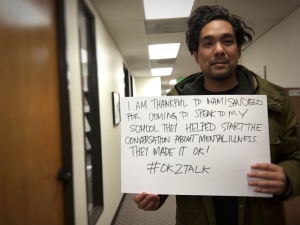Ending the Silence (ETS) is a NAMI classroom program, presented by two volunteers, including a young adult with lived experience of a mental health condition. Through ETS, high school students learn indicators of mental illness, how to help them-selves, friends, and family members who might need support.
Helping middle and high schoolers understand mental illness makes a big difference. We can teach them about the warning signs for themselves and their friends. NAMI Ending the Silence helps raise awareness and change perceptions around mental health conditions.
Through this free classroom presentation, students get to see the reality of living with a mental health condition. During the 50-minute presentation, a young adult living with mental illness and a family member tell their stories about mental health challenges, including what hurt and what helped.
Why Ending the Silence Matters
1 in 5 kids experiences a mental health condition
…Only 20% of them actually get help
About 50% of students ages 14+ with a mental health condition will drop out of school
Suicide is the second-leading cause of death for 15-24 year olds
The earlier the better: early identification and intervention provides better outcomes
What Your Students Get
Moving stories from positive role models have the power to change kids’ views. The discussion gives students the rare opportunity to ask questions about mental health challenges to people who have lived it. The presentation’s message of empathy and hope encourages students to actively care for themselves and their friends. It also teaches them it’s okay to talk about what they’re feeling. NAMI Ending the Silence covers:

- Early warning signs
- Facts and statistics about youth and mental health conditions
- When, where and how to get help for themselves or their friends
- When it’s not okay to keep a secret
What People Are Saying
Host a Presentation
“I’m really grateful and glad that you talked to us. I often feel very alone or weird because many kids my age don’t understand. But, now I’m sure they would be more supportive of me.”
“It is amazing what just one day, one talk can do. You never really know what’s going on in the brain of any particular student.”
